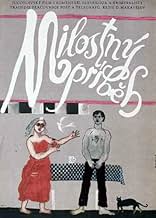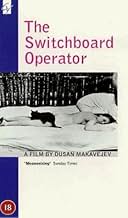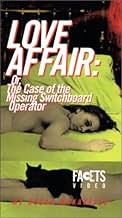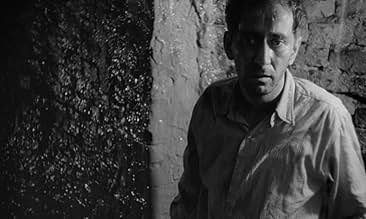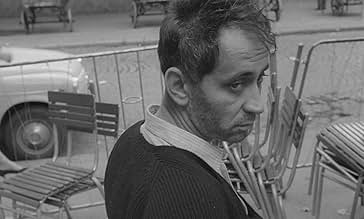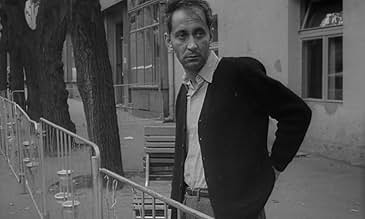IMDb-BEWERTUNG
7,3/10
2030
IHRE BEWERTUNG
Füge eine Handlung in deiner Sprache hinzuA young female starts a love relationship with a serious young man. However, while he is away on business, she gets lonely and succumbs to her colleague's desires.A young female starts a love relationship with a serious young man. However, while he is away on business, she gets lonely and succumbs to her colleague's desires.A young female starts a love relationship with a serious young man. However, while he is away on business, she gets lonely and succumbs to her colleague's desires.
- Regie
- Drehbuch
- Hauptbesetzung
Aleksander Kostic
- Ekspert za seksualna pitanja
- (as Dr Aleksandar Dj Kostic)
Zivojin Aleksic
- Ekspert za kriminalistiku
- (as Dr Zivojin L Aleksic)
Dragan Obradovic
- Obducent
- (as Dr Dragan Obradovic)
Empfohlene Bewertungen
10dragokin
The combination of almost documentary approach with non-linear storytelling makes Love Affair arguably Makavejev's finest work.
The documentary approach, including a lot of archive footage, echoes Innocence Unprotected (Nevinost bez zatite) as we follow common people during what turned out to be socialism's heyday in former Yugoslavia.
Non-linear storytelling has later been driven to the excess in WR: Mysteries of Organism (WR: Misterije organizma) rendering Love Affair much more accessible.
This must have been an extraordinary movie at the time, along with rather brave Eva Ras in one of the lead roles.
The documentary approach, including a lot of archive footage, echoes Innocence Unprotected (Nevinost bez zatite) as we follow common people during what turned out to be socialism's heyday in former Yugoslavia.
Non-linear storytelling has later been driven to the excess in WR: Mysteries of Organism (WR: Misterije organizma) rendering Love Affair much more accessible.
This must have been an extraordinary movie at the time, along with rather brave Eva Ras in one of the lead roles.
What I enjoyed most about this inexplicable Yugoslavian film was the source of pleasure in watching a movie filmed on grainy, imprecise celluloid stock. Every scene hums with that lovely old-fashioned atmosphere of maddeningly strenuous traditional film-making. We can sense the boom mikes, the film reel, the guys with big, uncomfortable headphones, and the director with a big vision that frustrates him by communication breakdown, as the outcome of his film is a bewilderingly ambiguous celluloid mishmash of sex, young lovers, totalitarian Yugoslavia, and nonlinear narrative structure.
And as such, it is a joy! It splurges and has fun! In one hour and nine minutes, its main thread, concerning a Hungarian switchboard operator who meets and falls in love with a Muslim who soon moves into her apartment much to the jealous chagrin of an imposing postal worker, intruding some touching intercuts of archive footage that give impressions of lives ensnared in totalitarian society, a brief history of how the gray rat infested Europe, and a sexologist in his study talking about the history of sex. Even the central train of thought is deconstructed into ambiguity as, seemingly at the same time, the police are investigating the drowning of a young woman.
Director Dusan Makavejev seems to have simply made a multi-faceted montage of Yugoslavia and reflections based on its time, 1967. In spite of its self-indulgence, as was a common limitation of progressive European art-house films of the time, it is very enjoyable.
And as such, it is a joy! It splurges and has fun! In one hour and nine minutes, its main thread, concerning a Hungarian switchboard operator who meets and falls in love with a Muslim who soon moves into her apartment much to the jealous chagrin of an imposing postal worker, intruding some touching intercuts of archive footage that give impressions of lives ensnared in totalitarian society, a brief history of how the gray rat infested Europe, and a sexologist in his study talking about the history of sex. Even the central train of thought is deconstructed into ambiguity as, seemingly at the same time, the police are investigating the drowning of a young woman.
Director Dusan Makavejev seems to have simply made a multi-faceted montage of Yugoslavia and reflections based on its time, 1967. In spite of its self-indulgence, as was a common limitation of progressive European art-house films of the time, it is very enjoyable.
Film for me is a matter of apprehension, of temporal experience of who you are relative to what is playing before you. So I don't care about a historicist or cinematic scholarly approach to films, in that film (and history) by itself is nothing, a carved artifact. This is my way of saying that there are probably several reasons to find this interesting, as token of 60s Yugoslav mores and 60s New Wave, admire the technique, which is wonderful in its freedom and placing. But for me, none of that matters when it doesn't enliven me.
A sexologist opens the film by humorously explaining the hidden omnipresence of sex in all we do, establishing the essence of the film as something to be secretly whispered and discovered.
The film follows a relationship between a rat exterminator and a blonde switchboard operator around Belgrade, the ups and downs. Salad days, captured with deliberate languidness. Eventually, there is betrayal and tragedy.
The point seems to be, contrasted levels of apprehension: everyday life in the affair in its dullness, small joy and unpredictability, with the system that frames that life as story, attempting to explain: 'experts' lecture on various topics, polemic footage of revolution play in ironic celebration, histories are recounted in voice-over. But you'll note, for instance, that the sexologist makes up nearly everything he says: Rembrandt did not paint sex, Mesopotamian priests did not sit ontop of a phallic column for days. The same fabrication then extends in the footage of joyous communist parades, a similarly subversive ploy is found in the silent Mr. West in the Land of the Bolsheviks.
But it's a weird, incongruent alignment of cycles that fails and fails to build for an hour. One hour felt like two. A big reason seems to be that this sort of bare observation was fresh at the time, but overly familiar now so all the vitality has been zapped out.
It just wastes what could have been a tremendously powerful last scene, where so much of what we see could be toyed with as different levels of involved understanding: a murder has been set up early in the film, but we don't know it's going to feature in the story, the different levels are that suddenly we are aware of what's coming (the murder), unexpectedly what we find out (that it was an accident), and what were the human emotional dynamics (regret and despair, not hate). Imagine the richness..
A sexologist opens the film by humorously explaining the hidden omnipresence of sex in all we do, establishing the essence of the film as something to be secretly whispered and discovered.
The film follows a relationship between a rat exterminator and a blonde switchboard operator around Belgrade, the ups and downs. Salad days, captured with deliberate languidness. Eventually, there is betrayal and tragedy.
The point seems to be, contrasted levels of apprehension: everyday life in the affair in its dullness, small joy and unpredictability, with the system that frames that life as story, attempting to explain: 'experts' lecture on various topics, polemic footage of revolution play in ironic celebration, histories are recounted in voice-over. But you'll note, for instance, that the sexologist makes up nearly everything he says: Rembrandt did not paint sex, Mesopotamian priests did not sit ontop of a phallic column for days. The same fabrication then extends in the footage of joyous communist parades, a similarly subversive ploy is found in the silent Mr. West in the Land of the Bolsheviks.
But it's a weird, incongruent alignment of cycles that fails and fails to build for an hour. One hour felt like two. A big reason seems to be that this sort of bare observation was fresh at the time, but overly familiar now so all the vitality has been zapped out.
It just wastes what could have been a tremendously powerful last scene, where so much of what we see could be toyed with as different levels of involved understanding: a murder has been set up early in the film, but we don't know it's going to feature in the story, the different levels are that suddenly we are aware of what's coming (the murder), unexpectedly what we find out (that it was an accident), and what were the human emotional dynamics (regret and despair, not hate). Imagine the richness..
Dusan Makavejev is probably not a name that most people will recognize, but film buffs should. In the late '60s he was part of a wave of Yugoslav filmmakers who changed the face of that country's cinema (much like Mike Nichols in the US) in what got called the Black Wave. Since lots of people in the US only learned of Yugoslavia from the horrors of the 1990s war in Bosnia, it might surprise them that the country had a thriving film industry for a long time.
Anyway, Makavejev's "Ljubavni slucaj ili tragedija sluzbenice P. T. T." ("Love Affair, or the Case of the Missing Switchboard Operator" in English) tells of a romance between a switchboard operator and a sanitation inspector. I figure that the movie must've been hard to make, given some of the explicit scenes. But more important is the point that the movie makes about relationships, and it doesn't hold back.
Like "Carnal Knowledge" and "Portnoy's Complaint", this movie shows that relationships are bound to come with complications. I recommend it to everyone.
Anyway, Makavejev's "Ljubavni slucaj ili tragedija sluzbenice P. T. T." ("Love Affair, or the Case of the Missing Switchboard Operator" in English) tells of a romance between a switchboard operator and a sanitation inspector. I figure that the movie must've been hard to make, given some of the explicit scenes. But more important is the point that the movie makes about relationships, and it doesn't hold back.
Like "Carnal Knowledge" and "Portnoy's Complaint", this movie shows that relationships are bound to come with complications. I recommend it to everyone.
This is not only a great little movie, but also a great time-capsule of late-'60s Yugoslavia (a nation since destroyed by way of violent imperialist intervention).
A young Hungarian woman and an older, Serbian man enter into a relationship under the internationalist, multi-ethnic, mid-twentieth century culture of communist Yugoslavia. This work contains scenes of beautiful, deeply moving, intimacy and sexuality.
The contradictions of this culture are made plain within the movie by reference to scenes from a Russian revolutionary film by Dziga Vertoz: Committed communist masses dismantle an old Cathedral- their cause is clearly popular and democratic, yet it is intolerant of an institution that has itself embodied intolerance for millennia. "Revolutionary", "scientific" humanity remains constellated within a dialectic of resentment.
Ultimately, human frailty destroys both the Hungarian and the Serbian. Misunderstanding and jealousy cause the lovers to turn on, and destroy, each other within the the terms set forth by this "revolutionary" society. Progress creates the illusion of enlightenment. But ultimately it is human nature that decides our fate.
This outlook ultimately qualifies writer-director Dusan Makavejev as a philosophical reactionary, albeit an exceptionally creative one.
A young Hungarian woman and an older, Serbian man enter into a relationship under the internationalist, multi-ethnic, mid-twentieth century culture of communist Yugoslavia. This work contains scenes of beautiful, deeply moving, intimacy and sexuality.
The contradictions of this culture are made plain within the movie by reference to scenes from a Russian revolutionary film by Dziga Vertoz: Committed communist masses dismantle an old Cathedral- their cause is clearly popular and democratic, yet it is intolerant of an institution that has itself embodied intolerance for millennia. "Revolutionary", "scientific" humanity remains constellated within a dialectic of resentment.
Ultimately, human frailty destroys both the Hungarian and the Serbian. Misunderstanding and jealousy cause the lovers to turn on, and destroy, each other within the the terms set forth by this "revolutionary" society. Progress creates the illusion of enlightenment. But ultimately it is human nature that decides our fate.
This outlook ultimately qualifies writer-director Dusan Makavejev as a philosophical reactionary, albeit an exceptionally creative one.
Wusstest du schon
- WissenswertesThe film was initially refused a UK certificate by the BBFC owing to shots of pubic hair, though the distributor himself partly ruined its chances by ignoring the film's creative aspects and instead telling censor John Trevelyan "I am sending you a film with a few tits in it. I don't think much of it but I can sell it to the sex theaters". It was eventually passed with minor cuts in 1969 and released fully uncut on video in 1996.
- VerbindungenFeatured in Zabranjeni bez zabrane (2007)
Top-Auswahl
Melde dich zum Bewerten an und greife auf die Watchlist für personalisierte Empfehlungen zu.
Details
- Erscheinungsdatum
- Herkunftsland
- Sprachen
- Auch bekannt als
- Love Affair, or The Case of the Missing Switchboard Operator
- Produktionsfirma
- Weitere beteiligte Unternehmen bei IMDbPro anzeigen
- Laufzeit
- 1 Std. 19 Min.(79 min)
- Farbe
- Sound-Mix
- Seitenverhältnis
- 1.66 : 1
Zu dieser Seite beitragen
Bearbeitung vorschlagen oder fehlenden Inhalt hinzufügen

